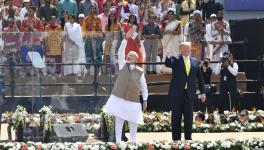Aadhaar: The Lies and The Realities...
The Aadhaar (Targeted Delivery of Financial and Other Subsidies, Benefits and Services) Bill, 2016 has been passed in Lok Sabha. What does this Bill mean for people and what does it entail? Aadhaar, the 12-digit individual identification number issued by the Unique Identification Authority of India on behalf of the Government of India, is projected as a proof of one’s address and other important details. Aadhaar relies on the biometric information of the person, including iris recognition and fingerprints. By giving a statutory backing to Aadhaar, the government intends to provide subsidies and other benefits to individuals residing in the country. While the BJP government believes that such a move will prevent the leakage of subsidies, there are stiff opposition to this move. Finance Minister Arun Jailtey presented the Aadhaar Bill as a Money Bill in the Lok Sabha on March 3, 2016, a move that put a huge question mark over the intentions of the government.
Newsclick interviewed Prof. R.Ramakumar of the Tata Institute of Social Sciences to understand the politics and controversy behind the Bill. According to Prof. Ramakumar, the move by the government to introduce the bill as a money bill is an attempt to destroy the federal fabric of the Indian constitution.

Image Courtesy: youtube.com
Rough Transcript:
Rishab Bailey (RB): Hello and welcome to Newsclick. The current session of parliament seen the Loksabha pass the Aadhaar targeted services of financial and other subsidy benefits and services bill as a money bill. This is despite the protests of the opposition. The bill gives statutory backing to the Aadhaar project and as per the government enabled efficiencies in the disbursement of benefits to the Indian citizens and enables better targeting of those that require state assistance. This will supposedly free up a large amount of resources the state can better use for social upliftment projects and other various projects they might have. The law has come in for a great deal of criticism from activists and academics alike. To explain why this projects is being treated with such suspicion, we are joined by rather outspoken critique if I may say so of the UID project Prof. R. Ramkumar from the Tata Institute of Social Sciences in Mumbai. Thanks for joining us Professor. I am going to jump straight in and start off with straight political questions. The BJP when in opposition had raised various problems with the Aadhaar project some of which echo with independent voices outside the political sphere has also said. Now, has the present has made any changes to the scheme as proposed by UPA government essentially as the BJP addressed what it felt were the shortcomings in the law previously.
R. Ramakumar (RR): The problem really that the BJP raised at that point of time in the beginning was related to national security. That the compromise of the national security because the initial conception of the idea of national identity number was by the earlier the Atal Behari Government which is now continued as National Population Register or PNPAR. Now later however, more problems came to be raised by the spokespersons BJP themselves officially. The first instance was when the then leader of Rajya Sabha and currently Minister of Finance Arun Jaitley's call details, telephone details were illegally obtained by the then UPA government allegedly so and Mr. Arun Jaitley came out very powerfully in favour of the right to privacy. In fact, in a blog he wrote in 2003, Mr. Arun Jaitley had actually said that the right to privacy is a part of right to liberty and hence embedded in article 21 and hence a fundamental right and unfortunately it is the same position that Mr. Jaitley's Attorney General counters in the supreme court today. In fact, he at that point of time said it is indeed a fundamental right and hence he said the call detail records been easily be obtained by a head constable etc. is a huge invasion into ones privacy and now with Aadhaar coming in he said these problems gets exacerbated and hence we need much more care to how to legislate about these affairs. That was the point Arun Jaitly had made. Thanks to a problem he himself ran into regarding privacy. Mr. Narendra Modi currently Prime Minister had a different problem. He said states were not consulted. He said it's actually a problem of federalism in India and hence a problem of democracy that the government is not discussing these matter with state governments at all. It's another irony just like Arun Jaitley's lack of support for the right to privacy as a constitutional right today. Narendra Modi has now decided to bypass the Rajya Sabha classifying this bill as a Money Bill and Rajya Sabha is actually the house of states. So it's an irony that Narendra Modi once upon a time said that it's actually violates the principles of federalism but he now goes around bypassing the Rajya Sabha which is just the same as violating federal principles.
RB: A very very interesting point there. Now, supreme court has previously held that Aadhaar can not be mandatory and can not be a pre-requisite for accessing services. How does this new bill effect this statement of the supreme court. Now can citizens actually be forced to handover bio-metric details and so on to the authorities in order to access basic and essential services. In fact, John --- has written a piece in today's newspaper where he talks about the various kinds of services you could require that Aadhaar, for buying a sim card for instance. So how do you see the new bill working?
RR: See the matter under the consideration of the Supreme Court now is extremely significant. It is actually considering the question of whether privacy is indeed a fundamental right enshrined in article 21or not. That's a question. The argument of the attorney general Mukul Rohtagi in the court was that it is not. The earlier benches whichever benches which actually said that it is indeed a fundamental right were actually a small benches and hence we need to look for the verdicts of the larger benches which were given a more vague interpretation of whether privacy is a fundamental right or not. Now, the supreme court the bench which considered the case very clearly said if article 21 does not contain the right to privacy it's actually of now use. Almost, it made a remark very close to that and then it said, however, we feel that reasons for judicial integrity it is better that such a decision is arrived at a larger constitutional bench, then they have referred to a larger constitutional bench which has been constituted but it has not met yet. Now, however, till then the Supreme Court said you can not make this mandatory and till then you can not make Aadhaar compulsory for availing any otherwise your right kind of service from the government. It is this standing order of the Supreme Court that has been preempted by the current legislation which is just a money bill. So it is very interesting that a money bill is being used a) to bring in a legislation which has implications for the violation of the fundamental rights of the citizen is the whole point. If any legislation has by indirectly or directly violates a fundamental right of a citizen then it needs deeper examination. It needs deeper examination by the standing committee probably by legal experts by the Rajya Sabha as part of a debate and so on. None of it has been done. So I see it as an insult to the Supreme Court as an utter act of disregard for the orders of the Supreme Court thereby money bill tries to make it mandatory. There is another point which I would like to mention here. Which is that the earlier chairman of UADAI Mr. Nandan Nilenkani he said that both the UPA version and the NDA version of the bill calls it entitlement. So you have a fundamental right. So suppose you have a right to food, now you go to a ration shop to get that right to food. But then you are told you have a right to food but then you will need an Aadhaar number for getting that right to food. So Nilekani's argument at that point of time was that Aadhaar is actually a right to right. So it is actually putting in intermediate structure which is completely unnecessary between citizen and his right. The citizen has a right to food but to ensure there is another thing that comes in between. There is another obstruction that comes in between. The right then becomes meaningless.
RB: So isn't this an aspect that courts should also actually examine on whether you can create these sort of barriers to accessing fundamental rights which are as the name suggests is fundamental to citizenship.
RR: In my view takes should must take this up as a suo moto as a contempt to it's own order as an act of contempt of it's own order where it had actually said that it should not be mandatory. But the court should take into consideration the fact that parts of this legislation, I am not saying the whole legislation, parts of this legislation have the potential to violate fundamental rights which are given to the citizen or at least a fundamental right which is currently sub-judice in front of it's constitutional bench, at least till then this should not be signed by the President. Or then it should basically take a proper financial bill and be considered by all layers of the Loksabha and Rajyasabha including the standing committee.
RB: Now, you have already touched on this topic briefly since it is one of the core issues behind the Aadhaar projects I did want your opinions on the lack or otherwise the privacy protection surrounding the Aadhaar project as well as the question of data generated by the UADAI authority. So could you quickly explain the primary criticism of the project on these grounds and also new bill addresses these issues. For instance, the bill states that information can only be disclosed on the grounds of national security in pursuant to a court order. There are also punitive provisions for unauthorized views and disclosure of information. So are these checks do you think insufficient and why?
RR: The fundamental problem with the bill is that it says that the data will belong to the CIDR which is a government institution and it says that the data stored in CIDR will be used only for authentication and will not be given to anybody. Now, that is not quite as ensuring that the data that is actually present collected, used and stored outside the CIDR is protected in the same way. The problem, the fallacy in the bill is that it considers the violation of privacy a rising only from either a theft or a leak of data that is stored in the CIDR. It does not adequately consider the protection of that data which is outside the CIDR yet connected to the CIDR.
RB: Could you give an example?
RR: For example if you go to an agency to get a service it asks your fingerprints for the authentication of CIDR. A copy of that fingerprint may be kept with agency for future use. Is that data protected? Can that agency use data otherwise? there is some meek reference to that in the bill however, it does not take into consideration of wide ramifications of this pervasiveness of this biometric information across different agencies public and private and the violation of the privacy that may result as a result of it. The whole point is we need only a separate privacy law and in addition a separate data protection law can take care of this vastness of this problem.
RB: Now various studies in the different parts of the country show that the Aadhaar or UID scheme is not actually working in the various places it has been used for a variety of reason ranging from the bio-metric system itself not been very reliable due to lack of Internet connectivity and so on. I have seen reports that estimate that anywhere from 40 to 70 percent of in fact all transactions involving biometrics are returned as failed. So how do you see this issue being resolved. Can it be resolved within the current architecture of the scheme.
RR: You know it is a systemic problem in a way that Aadhaar project is conceived and is sought to be implemented. Right from day one, there have been points made including people like me and others who were arguing against it that biometric is going to be the core problem in implementation of this Aadhaar project. Even at that point of time, we had raised this matter a government trying a pilot project in one district for the implementation of LPG connections thereby agreeing, if you are going to get a new LPG cylinder, you have to actually give your fingerprint only then it gets authenticated. You can take the cylinder home. Now, this was sought to be implemented as a pilot project and the success rate at that point of time as was reported to the newspapers like The Hindu was only 67%. in other words, 33% was the failure rate. Now, such reports were coming from 2011 and 2012 itself. So it's not a new issue which has been raised. Then, was sort to be implemented in different projects of NREGS in states like Jharkhand. Then it was sought to be implemented in pilot projects like PDS in states like Andhra Pradesh. From everywhere, reports have come that one of the main problems has been biometrics even when the person seeking authentication is indeed the same person so there is an error rate which is very high. Secondly, Internet connections, electricity connections are very poor and as a result it takes a lot of time as been pointed out in the newspaper article that you referred to a little while back. Sometimes, it takes 8 to 10 minutes for the transaction to be completed because the data has to be sent it is a 4 or 5 MB packet. It has to go into the authentication server and then come back. This has resulted to the long queue and additional technical infrastructure being generated between the customer and service. So this is not a new problem. I am trying to say that this has not been a new problem. This has been pointed out from the beginning itself. UIDA's consultancy report itself has pointed out this source of error in a big way. UIDA however, brushed them aside saying that we are not concerned with this, it will ultimately work. That was the very confident point they made. However, reports coming from everywhere points that error rates coming from biometric authentication are very high and ascend you actually a source of exclusion of a large number of poor consumers
RB: Now, given that the Aadhaar project has been going on for a couple of years, is there any evidence at all for improved target or delivery of benefits to it's citizens. I mean there must be some benefits for the projects in the time that it is actually been used. For instance, has it helped in reducing the amount of documentation that the citizens needs to have because now, you can have one card instead of fifteen licenses, so on and so forth or else, may be it helps in reducing duplication of beneficiary list. So are there actually some benefits to to the Aadhaar bill and do you think that these can be cut away from the various drawbacks that you have already pointed out.
RR: Let me say at the outset that it is a myth that Aadhaar is an absolute necessity to weed out duplicates. Look at how Chattisgarh PDS was reformed for a period of time. It happened before Aadhaar and Chattisgarh PDS officials actually removed all the duplicates from the list of beneficiaries without an Aadhaar. It just needs a committed set of machinery to make it happen. So first, it's a myth that you need Aadhaar to weed out duplicates. Number 2 is that even if Aadhaar is there, one interesting data point will be very useful here because a very large majority of a people who applied for Aadhaar already had a identity card something of that sort. Either a passport, a ration card or something. They already had an identity document even while they applied for Aadhaar. In other words, it is a second myth that a large number of people are without identity and hence you need Aadhaar and hence you need Aadhaar to solve the lack of identity documents. That itself is a second myth that was generated in this whole publicity blitzkrieg of Aadhaar. The third is even if Aadhaar is available does it attack the source of corruption or not. It is the PDS for example, the major source of corruption PDS is not between the ration shop and the consumer but between the go down and the ration shop. The grain simply does not reach the ration shop from the go-down of the FCI. That's the stretch where the diversion happens. Once it reaches the ration shop there is a much of a problem in the grain reaching the consumer. So between the FCI and the ration shop where actually the largest amount of diversion happens Aadhaar has no role to play. Aadhaar has a role to play in the second stage which is between the ration shop and the customer where in any case the amount of corruption is significantly less. So I think, we need to logically think about processes involved in where corruption occurs and whether schemes like Aadhaar can actually make a difference to that stretch where corruption actually takes place. I don't think that is a case.
RB: I think it is an excellent note to leave this interview on. We do hope that you will join us again to follow this story as and when develops. Thank you Prof. Ramkumar for joining us today and thank you for watching Newsclick.
Get the latest reports & analysis with people's perspective on Protests, movements & deep analytical videos, discussions of the current affairs in your Telegram app. Subscribe to NewsClick's Telegram channel & get Real-Time updates on stories, as they get published on our website.
























